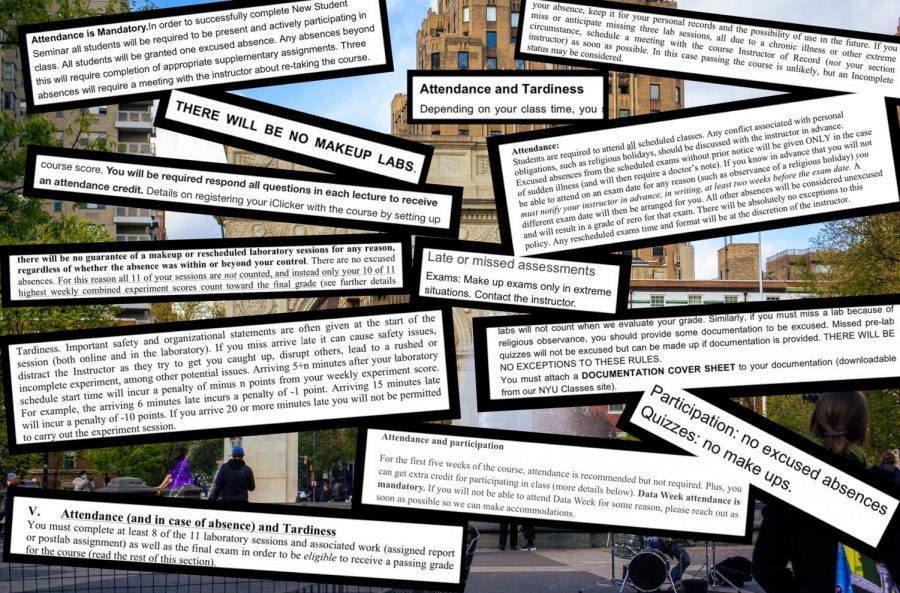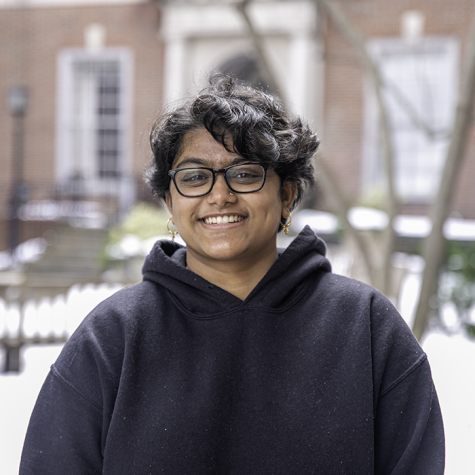Opinion: Mandatory attendance policies are irrational and ableist
Before the pandemic, some NYU professors and schools were notorious for strict attendance policies. As the pandemic continues with rising cases and dangerous new variants, though, do mandatory attendance policies make sense for NYU’s first in-person semester since the start of the pandemic?
NYU announced its plans to return to an in-person semester for the fall of 2021 however, there has been no broad action on addressing class attendance policies. With strict attendance policies along with the increasingly contagious new COVID variants like the delta variant, students worry that they will once again have to prioritize class attendance over their physical health. (Staff Illustration by Manasa Gudavalli)
August 25, 2021
In spring 2021, NYU announced its plans to return to an in-person semester in the fall. Along with the announcement, the university released a number of requirements to keep students safe from the virus during the upcoming semester, including a mandatory vaccination policy. Although the university is taking many precautions, there has been no broad action on addressing class attendance policies.
Prior to the pandemic, many professors were known to give only one or two excused absences per semester. Exceptions were only made in extenuating circumstances like family emergencies, serious illness or personal injury. However, even during those circumstances, students were obligated to provide proof like doctor’s notes or familial confirmation. These policies continued into the virtual classroom, only allowing at best for a few Zoom sessions to be missed. Still, the flexibility of online classes allowed disabled students, students who were feeling unwell and others to attend class without compromising their health or that of others.
A return to in-person education compels us to reconsider attendance policies. If only allotted a few absences, students worry that they will once again have to prioritize class attendance over their physical health. How many times have students ignored a runny nose, a sore throat or a slight fever to attend classes so as to not waste their absences? How many students have had no option but to go to class ill so as to not compromise their grades?
COVID variants like the delta variant have proven to be increasingly contagious, affecting even vaccinated individuals. Cold-like symptoms that a student could have previously ignored could now mean a vulnerable peer contracting COVID-19. Though masking is effective at reducing transmission, the risk of spreading the virus remains very real.
Additionally, the past year and a half of Zoom classes have significantly increased the accessibility of a college education to disabled students. Virtual classes allowed these students to circumvent the barriers to class attendance presented by in-person learning.
With the return of in-person classes, professors replicating pre-pandemic attendance policies without providing virtual classes as an accommodation perpetuate ableism in higher education. Disabled students face two options: jeopardize their health or jeopardize their education. Students who cannot attend class may fall behind and their grades may suffer, but students who prioritize attendance may also face serious health-related consequences.
Many are eager to come back to in-person classes this fall. It marks the significant progress we’ve made over the course of the pandemic, and it reminds us that there is hope for a post-COVID future. However, the pandemic highlighted the many failures of higher education — mandatory attendance policies are one of them. As we approach the fall semester, professors and NYU administration alike need to address this glaring issue. The public health and safety of this university and its students depend on it.
Contact Srishti Bungle at [email protected]

























































































































































